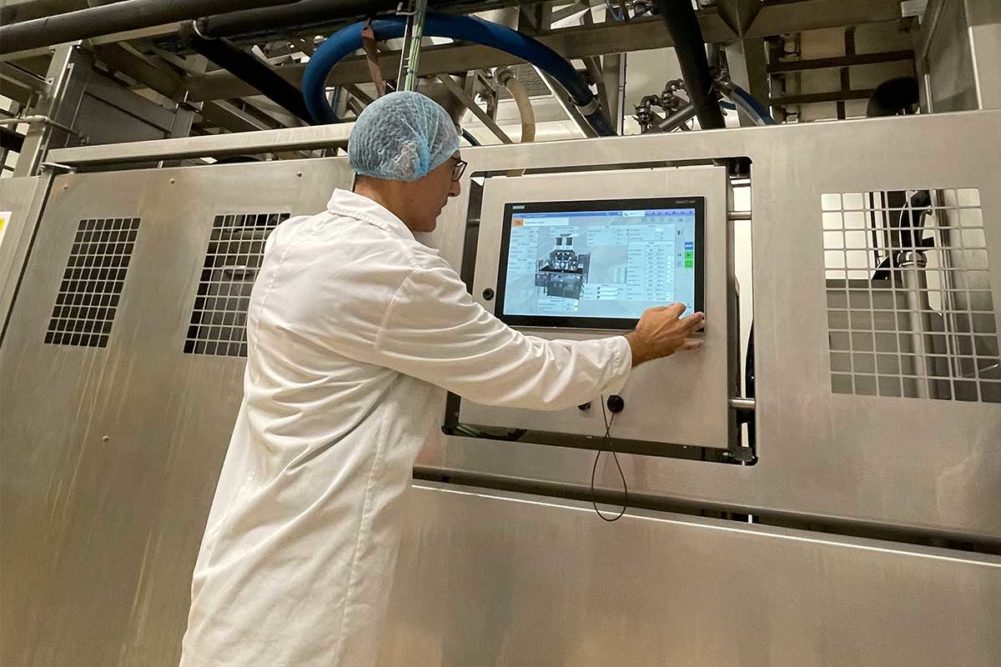Smart manufacturing is much more than shiny steel systems and the latest in technology. Bakeries and snack producers strategically use these advances in automation to identify emerging opportunities that come from their capital spending. That’s what the management team at Fantasy Cookie realized recently.
To expand and broaden its operation and customer base, the Sylmar, Calif.-based cookie and bar co-manufacturer completely remodeled its Arroyo Street facility and replaced one of its three aging production lines
Specifically, the company invested in a new 2,200-lb Peerless mixer with a versatile Reading Bakery Systems makeup line and state-of-the-art 100-foot tunnel oven that bolsters capacity by 30% or more.
For Russ Case, chief executive officer, the investment not only provided enhanced quality and capacity, but it also created several new avenues of growth.
“We had a couple of inquiries about nut-free products, and we were like, ‘Hey, wait a second. This is a brand new bakery,’ ” he pointed out. “This is a new oven. It’s never processed with nuts, so we turned this facility into a nut-free operation.”
Already, he added, the new production line is paying dividends, with two major new customers coming onboard and potentially another on the way.
“We got that business for two reasons. One was because of the new oven and the new capabilities that we have,” Case said. “It’s not only made us more competitive with our operating costs and pricing, but then there’s the nut-free claim that our customers can now make on their products.”
For Fantasy Cookie, the hybrid oven is also simple to run with its programmable features that control time, temperature and turbulence and reflect the products’ precise specifications, noted Joe Rivera, vice president of operations.
“This oven has the ability to be more intuitive in many ways,” he said. “You set it up, put it on to monitor, and it maintains that temperature and other conditions.”
The mixer establishes front-end controls, which will become increasingly critical during the hot summer months when ice is often added to keep doughs cool.
Moreover, co-extrusion enables the bakery to broaden its nutrition and snack bar portfolio with the potential to offer a greater number of allergen-free and other better-for-you products.
“Co-extrusion has been pretty hot right now because there’s a limited amount of capacity for co-manufacturers,” Case explained.
Moreover, the line’s three flowwrappers allow Fantasy Cookie to bolster its retail capabilities.
“Probably 75% to 80% of the volume that’s going to come off this line will be individually wrapped products,” Case said.
The additional efficiencies allow the company to lower overhead and be much more price competitive. Additionally, the business is broadening its product portfolio with more high-protein and better-for-you products that are popular with consumers at this time.
In today’s labor-challenged market, smart manufacturing involves taking a holistic approach and leveraging digitalization and automation to maximize efficiency while creating a more worker-friendly environment.
That’s especially true when it comes to packaging, noted Jorge Izquierdo, vice president of market development, PMMI, the association for packaging and processing.
“It’s about taking advantage of all of the new technologies to improve the productivity and reliability of your operation,” he said.
For the diverse baking industry, there may be multiple definitions for smart manufacturing. Some bakeries maximize throughput with dedicated lines.
Other co-manufacturers, as well as bakeries that serve the diversified foodservice market, must creatively manage a constantly shifting customer base.
“When I think about the bakeries of the future, it’s when [equipment] manufacturers make it possible for bakeries to make a plethora of SKUs with ease, so we’re talking about servo-driven technology,” explained Amy Estrada, project manager at CRB Group. “We’re talking about electronic changeovers with the push of a button as opposed to having to change out all these different parts. When I think about the bakery of the future, it’s technology that allows that easy flexibility and versatility for producing many SKUs.”
She noted the larger, multi-plant baking companies have embraced more advanced technology, data gathering and robotics. That’s because they often have the financial resources and skilled labor to support them.
She said smaller bakeries typically have a mix of older and new equipment, and they may be more “old school” with a workforce that needs greater support or the proper training and education to implement their investments in automation.
Meanwhile, Jim Vortherms, senior director, control systems integration at CRB Group, suggested that smart manufacturing comes from harnessing the data that bakeries and snack producers collect and discovering ways to improve operations through enhancing productivity, efficiency and final product quality.
Often it involves a partnership with consultants or other third parties that look at the needs for today and explore how to create a manufacturing environment that can respond to what the future may bring.
“We’re making sure that we’re going down the road you want to go down at this time, and you can make adjustments because … we don’t know what’s going to happen,” he said. “So the best we can do is plan for the future and adjust as we go.”
To compete successfully in the baking industry, not every company needs to be the biggest but rather the brightest manufacturer on the block.
This article is an excerpt from the March 2024 issue of Baking & Snack. To read the entire feature on Smart Manufacturing, click here.






